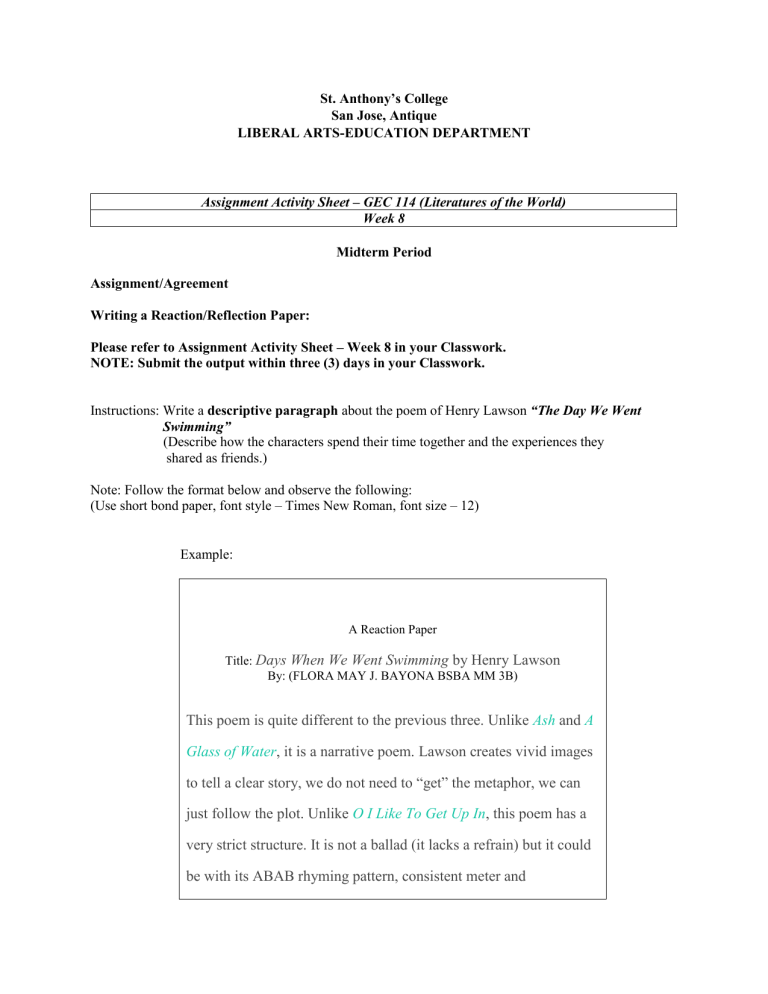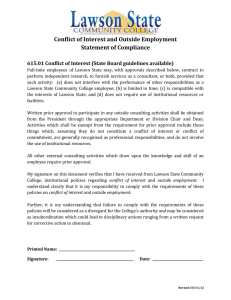
St. Anthony’s College San Jose, Antique LIBERAL ARTS-EDUCATION DEPARTMENT Assignment Activity Sheet – GEC 114 (Literatures of the World) Week 8 Midterm Period Assignment/Agreement Writing a Reaction/Reflection Paper: Please refer to Assignment Activity Sheet – Week 8 in your Classwork. NOTE: Submit the output within three (3) days in your Classwork. Instructions: Write a descriptive paragraph about the poem of Henry Lawson “The Day We Went Swimming” (Describe how the characters spend their time together and the experiences they shared as friends.) Note: Follow the format below and observe the following: (Use short bond paper, font style – Times New Roman, font size – 12) Example: A Reaction Paper Title: Days When We Went Swimming by Henry Lawson By: (FLORA MAY J. BAYONA BSBA MM 3B) This poem is quite different to the previous three. Unlike Ash and A Glass of Water, it is a narrative poem. Lawson creates vivid images to tell a clear story, we do not need to “get” the metaphor, we can just follow the plot. Unlike O I Like To Get Up In, this poem has a very strict structure. It is not a ballad (it lacks a refrain) but it could be with its ABAB rhyming pattern, consistent meter and symmetrical stanzas. Upon looking more closely, perhaps it is not so different to those poems. Like A Glass of Water, it speaks directly to us, Lawson calls us “old friend” and asks us to remember summers shared in a distant past. Like Ash it celebrates the joy of being in a body and the sad fact of its temporary state. Like O I Like To Get Up In it rejoices in “time wasting” and stolen pleasures. So, this is not totally unfamiliar territory after all: let’s dive in! This poem is highly sensual, the imagery immerses us in the gleeful afternoons of carefree youth. There are “breezes” and “waist-high” silver grass tickling our hero’s bare skin. The straightforward juxtaposition of the “air was hot, the water cool” is all the explanation needed as to why they simply had to swim in the billabong. It seems as though a good portion of the delight in this lark stems from the fact that it’s forbidden. The boys arrive at the pool riding “bare back”, collaborating with the unbridled steeds which have whisked them away from the lessons they should be attending. They have a “well-planned lie” to ensure they are covered for the afternoon, but Lawson points out that though this fun is “shared”, there is an understanding that it will be “paid for singly” if one of them is found out – no one is going to snitch. I absolutely love the brilliant irony of the “dust well rubbed on neck and face lest cleanliness betray us”, emphasising the purity of this water and their innocent enjoyment of it. The swim is genuinely restorative, a glorious respite from the scorched earth that surrounds the waterhole. As children they are “clean” (literally and ethically) as they romp but they but have to keep it secret because they are not entitled to this particular billabong. The valuable resource is subject to the possessive colonial dispositions of grown ups. The tension arises with the introduction of the antagonist, “farmer Kutz”. He is clearly an arrogant man, acting as though he “owned the county” when all he held was a “forty-acre block”. It’s interesting that Lawson points out that Kutz is “of the old-world school that men grew hard and grim in”, alluding to Australia’s youth as a nation compared to the “old-world” of the England it came from. This is perhaps a hint that these boys symbolise the opportunistic larrickinism that Lawson had noticed was beginning to define a culture distinct from Europe. He is also possibly referencing the harshness of his own father, with whom he had an extremely fractured relationship. I find it especially interesting that he didn’t give his farmer a name that rhymed with “block”. This is the only pair of lines that does not rhyme as they should. This farmer does not belong in the boy’s splendid world, but he violently stakes his claim in it. Though the persona looks back on the “days when we went swimming” with a glowing nostalgia, recalling the friends’ “kingly” nudity and relaxed “chumming”, there is a melancholy tinge to it. It’s not just the fact that they were rudely interrupted by a grumpy old brute brandishing a “cart-whip”, it’s the greater symbolism of the whole situation: They have grown up, they are now the adult men with “cups of sorrow brimming”. Lawson acknowledged that Kutz’s attitude was forged by difficult circumstances. These old friends have endured a lifetime of hardship since those glorious days “upon the sand”, moments now slipped through the hourglass and accessible only in memory. The boys may have run naked “across the paddocks” to escape Kutz’s wrath back then, but they could never outrun the relentless change of the seasons. I love this poem because it encourages us to remember the pleasure to be had in evading responsibility for an afternoon and further challenges us to flee the cranky adult Kutz that wends its “angry way” along the banks of our beings. It’s summer time, after all: relax, snatch time for yourself and those you love, escape the heat, show some skin, appreciate life’s simple pleasures.

